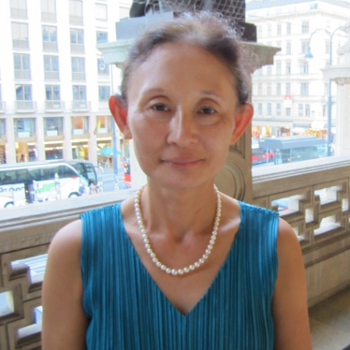Jake Heggie, composer of Dead Man Walking, describes the central question of the opera in the program note as “Are we for vengeance or forgiveness?” Based on the writings of Sister Helen Prejean, the opera follows the emotional journey of the nun as she meets and guides a death row inmate Joseph De Rocher. His initial hostility gives way to a final confession of his guilt as he faces death by lethal injection. Sister Helen accompanies the man who raped and killed a teenage girl as he does “the dead man walking,” the final walk of the prisoner to his death, and tells him to look upon her face as his final image of the world, as the face of God.
One does not have to be a Christian or a believer to be moved by the raw and sheer force of the story and music of the opera. Directed by Francesca Zambello, the simple staging with minimal props and effective use of lighting helps to focus on the powerful drama of crime and punishment. The prelude presents the heinous crime committed by De Rocher and his brother, depicting him as evil personified. The audience, along with Sister Helen, takes a difficult journey of understanding and forgiving the man. As his body convulses and then stills in death, we are left with a sense of futility of “justice” carried out as a vengeance for another life that will never be restored.
The musical language is varied and yet familiar. Structure of the opera is simple but ingenius. The prelude begins with atmospheric floating melodies whose themes recur in a more subtle manner throughout the opera. Sister Helen sings a hymn with children at the beginning of Act 1; she sings the same hymn a cappella in a broken voice at the end. The male world of the prison, the police and De Rocher, is couched in jazzy, rhythmic and syncopated music. The female world of Helen, the sisters, and De Rocher’s mother is melodic, lyrical, and quiet. Musical highlights are many, but standouts include De Rocher’s solo at the beginning of Act 2 after he learns that his final appeal for life has been denied; the duet of Sisters Helen and Rose that follows is hauntingly soft and gentle, at times reminiscent of Puccini.
Washington National Opera assembled a strong and committed cast for this superb masterpiece penned by Heggie in 2000. Kate Lindsey was an unassuming, yet poised Sister Helen, her quiet presence dominating her every scene. Her focused and slender mezzo was a perfect fit for the sincere and, at times, vulnerable nun whose faith proved to be the source of her strength. She was adept at singing soaring melodies with precise diction, and expressed the character’s inner turmoil through declamatory singing bordering on Sprechstimme. She was perhaps inspired by the presence of Susan Graham, the original Sister Helen at the 2000 première, now taking on the role of Mrs De Rocher, the convict’s mother. Graham’s strong vocal acting as a mother who pleads for her eldest son’s life despite his crime anchored the crucial scenes of the opera.
Michael Mayes was an experienced Joseph De Rocher whose stunning performance was another anchor of the success of this performance. He was physically imposing and menacing, and combined with his powerful baritone, this was an ideal and complete portrayal of a man growing up in poverty whose one night of excess led to his demise. His mastery of the role was such that one almost sympathized with him even knowing that he did indeed commit the horrible crime of which he was accused. Near the end, as he walked to his death, supported by two guards and guided by Sister Helen’s hand on his shoulder, as the dramatic music swelled to its shattering climax, the entire audience was holding its breath, many members in tears.
The notable supporting cast included Jacqueline Echols as a compassionate Sister Rose and Timothy J. Bruno as the warden. The two teenage victims’ parents were well sung contributors to the quintet with Sister Helen in Act 1. The chorus of men as prisoners, women as church members and children were splendid in ensemble scenes. The orchestra led by Michael Christie played the difficult music of shifting motifs, dynamics, rhythms and harmonies with eloquence and skill. Mr Christie moved the harrowing music drama with impeccable timing and volume control.
At the end of the evening, the audience was left with a wrenching experience of having witnessed a difficult question of life and death, crime and punishment, guilt and redemption, performed with complete emotional commitment. An unmissable experience indeed.




